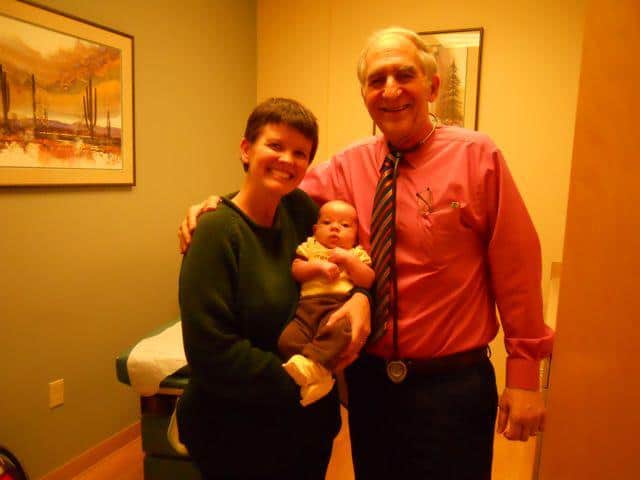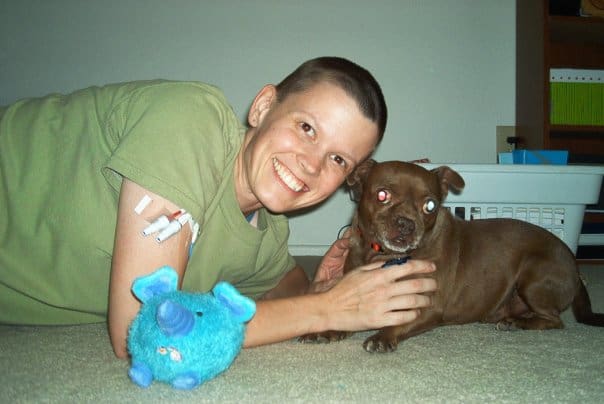It’s been 15 years.
Fifteen years ago yesterday, unable to breathe deeply or while laying down, I was admitted to my local hospital with what would eventually be diagnosed as Hodgkin’s Lymphoma.
It was a long road—two weeks until treatment started (though plenty of unpleasantries in those two weeks). Six months of chemo (extended by two weeks because I skipped a treatment to go to my sister’s wedding in October), ending the week before Thanksgiving. Five weeks of recuperating from chemo before three weeks of radiation.
It started May 16 and it “ended” January 21.
My journey was shorter than many, less arduous than many, and I’m here 15 years later, mostly intact, to talk about it.
Not everyone is so lucky. I have known too many people—from pre-teens to elderly—who cancer took. The number increases exponentially and the age range widens if I include people I’m two degrees of separation from, not just people I knew directly. I know people enduring it now. I know people who made it, but not without significant changes to their bodies, minds, or both. And of course, I know others like me who went through it, came out the other side more or less intact, and just kept moving.
In all the years since then, I’ve done a lot of writing.
I’ve written about prevention versus early detection. The majority of what is advertised as prevention is actually early detection. Having cancer and finding it early is drastically different than not having cancer. If you had to choose one, wouldn’t the choice be easy?
When up against something potentially lethal, we want it to be linear so we can wrap our minds around it better.
Cancer does not necessarily follow a linear path. Some can live in you for years without causing any problems. (Mine was estimated to be six months old when it was discovered.) Others spawn and take over and kill you in a matter of months. The size of the tumor is good for shock value (mine was a little smaller than a football in my chest), but size isn’t directly indicative of malignancy.
My oncologist told me that roughly two thirds of cancers are lifestyle-related. What you eat, what you drink, how much you move, what toxins you have in your home all matter. I’ve made significant changes to what and how I consume based on this.
He also told me that my relative ease going through chemo was directly caused by my being in good physical condition when I started. And that very few of his patients were in good physical condition.
I’ve written about my dislike for most of the cancer-related fundraisers, particularly the biggest pink one, and how the pink ribbon has hijacked useful and truthful information. Donating to those places isn’t inherently bad—do your research to know where the money goes—but hoping they’ll have a way to cure it when it’s your turn is not the best strategy.
Speaking of the pink hijacking, you can have breasts but not have breast cancer. Stop assuming women with cancer all have/had breast cancer.
Breast tissue is more sensitive than others to environmental changes and is a sort of canary in the coal mine. The rise of breast cancer should be a red flag to all of us that we’re poisoning ourselves. Those tags that say that this item is carcinogenic in California? Yeah. We should be paying attention. And food. We’ve trashed our food.
It matters.
If you know someone going through cancer treatments, hit them up in the second or third or sixth or eighth month of treatment. Most people most of the time hit the panic button when the diagnosis hits (understandable) and go back to their own lives two weeks later. As time passes, the path is harder because the beginning was so long ago, the end’s not in sight, and the side effects are worse as the body becomes less able to withstand the treatment. The flowers have long since wilted, the visitors have gone. The middle is lonely.
My cancer treatments put me at higher risk for secondary cancers, and there’s no time limit on those. I’m also at increased risk for some significant heart and lung issues that take 15 to 20 years before they manifest. Radiation is nasty stuff.
The thing about cancer is you don’t really know you’ve beaten it until you die of something else.
Regardless of what does me in, I’m hoping it’s still a while from now. I have a boy who is going to Mars, and I’d like to be full of anxiety watching him do it rather than have it done in memory of. Also hoping that my heart and lungs keep working as they should—I need exercise for mental health stability—and hoping that I don’t win another drawing for a cancer bus ride in the interim.
While infertility was a possible side effect, my son did arrive in the usual way after treatments. There’s been noise about chemo-induced infertility during the last decade and a half. I hope doctors are doing better now talking to young patients about this and about their options prior to starting treatments. All they told me was “possible long-term side effect.” My oncologist was delighted to meet my son at my four-year appointment; he didn’t see many post-chemo babies. He’s retired now. I’d love to be able to give him an update.

Fifteen years ago, “young adult” was the fastest growing cancer demographic, defined as 15- to 40-year-olds. I haven’t kept up on those kinds of statistics, but that’s not a good trend.
Fifteen years later, it’s part of my story. It informs some of my choices. It gives me empathy. It lets me help others who are dealing with their own or someone else’s diagnosis.
I wrote a book about it and the before-and-after parts of my journey to healthier that publishers aren’t picking up. I considered Kickstarting it, but it’ll cost thousands of dollars to produce well and I don’t have confidence in raising enough money to cover costs, never mind make a few pesos. And I’d rather not do it at all than do it not well.
I have the privilege of forgetting. It was a long time ago. A lot of life has happened since then. I don’t remember all the details. Most of the anniversaries I remember because they pop up in my Facebook memories. I joined Facebook while I was going through chemo and had insomnia but also had brain fog and couldn’t read actual books. So much time without anything to do and not able to read. It was one of the worst parts of that time.
Regardless of preventability, shaming people for their cancer is a big NO for so many reasons. Unless you somehow have definitive knowledge about the origins of their cancer, you can’t say where it came from. You can speculate. You don’t know. Keep your mouth shut.
Honestly, I feel like that applies to so much more than cancer.
In sum: be mindful about what you eat and drink and bring into your environment. That’s not a guarantee that you’ll be OK, but it increases your odds. (Helps you to be overall healthier also, which is a generic plus.) Reach out to people who are living through it, especially if it’s been a couple of months. (Yes, it feels awkward. Suck it up. Going through chemo feels worse.) And don’t judge.
That’s my 15-year rant.

I was so fortunate to read some of your book drafts just before I went through the journey with my mum. It helped me understand the treatment process so it wasn’t such a shock. You taught me not to buy flowers for someone on the oncology ward (although i still forgot in my distress and bought them anyway) and to keep those post chemo weekends free to help out. Although your writing is still bittersweet. My mum was one of those super healthy, clean living obsessed people who unfortunately took the advice of an ignorant doctor who gave her too much medication for another condition that then caused a rare, preventable cancer to ravage her. So unlike mum I haven’t given up sugar or wine! But I count each day as a blessing because I’m on that bus too.
Thanks for writing about this stuff though. I would buy your book!
Both glad and sorry to be helpful. Cancer sucks.
And I will someday have a book to sell. I don’t know what it’ll look like. Still trying!